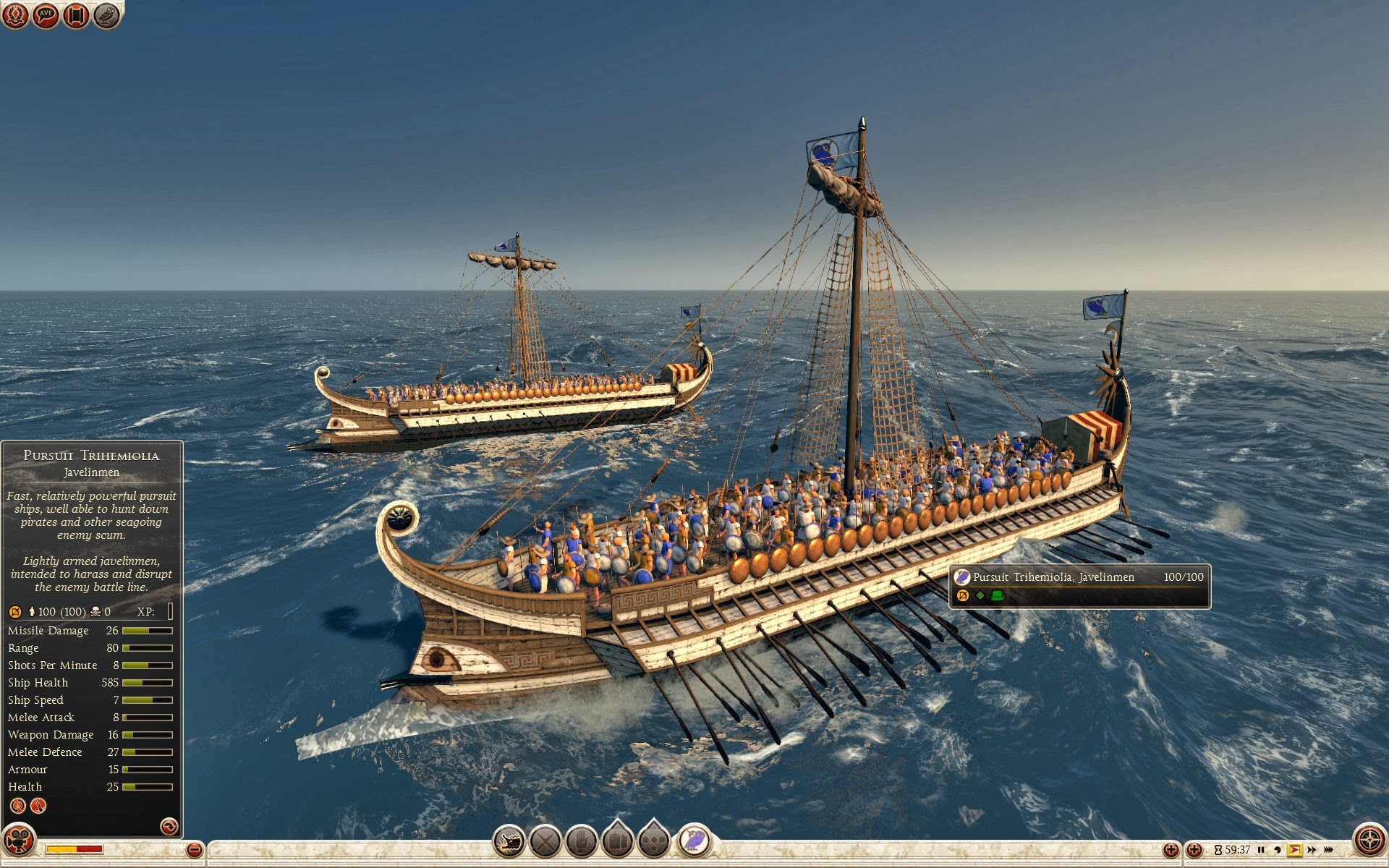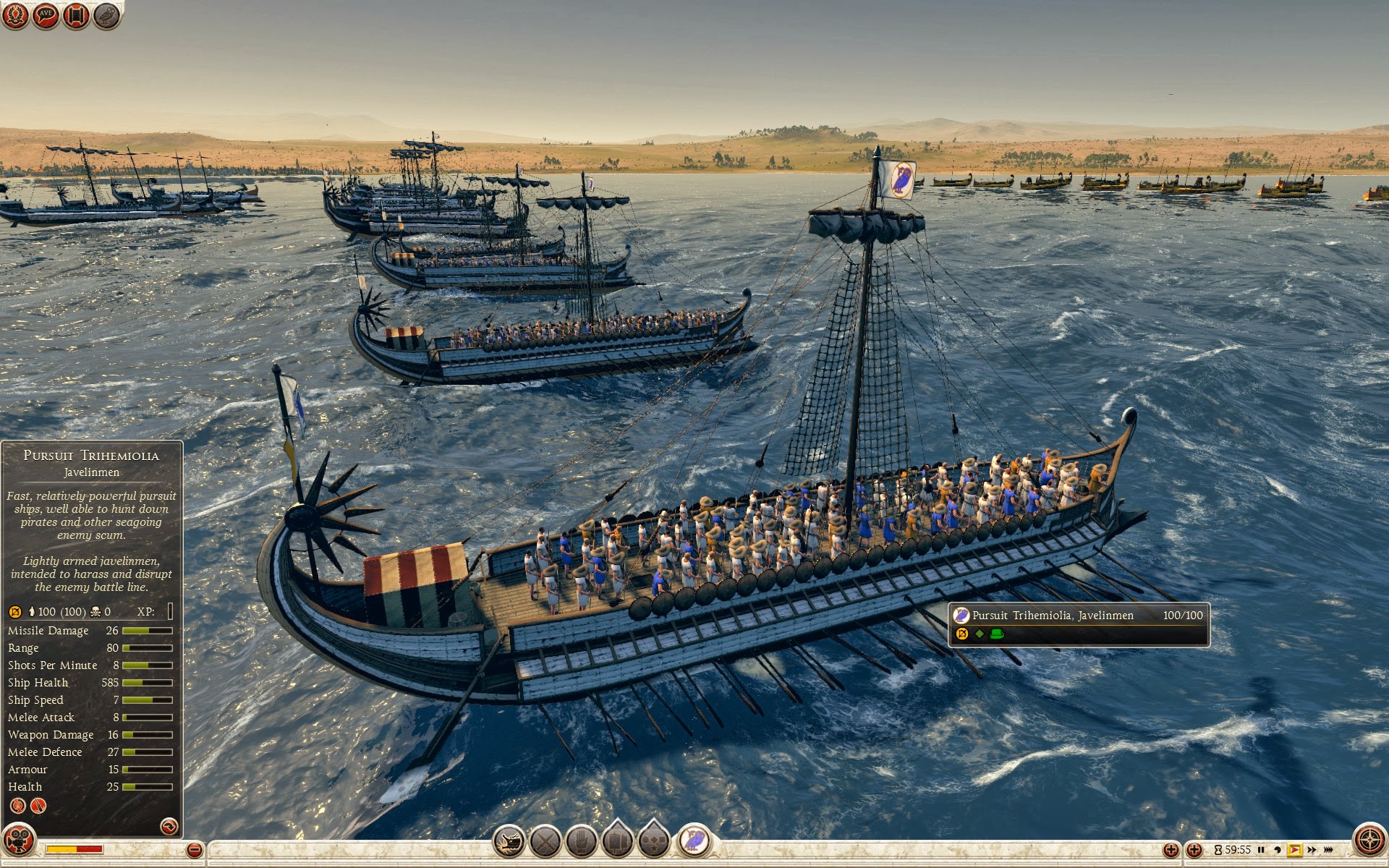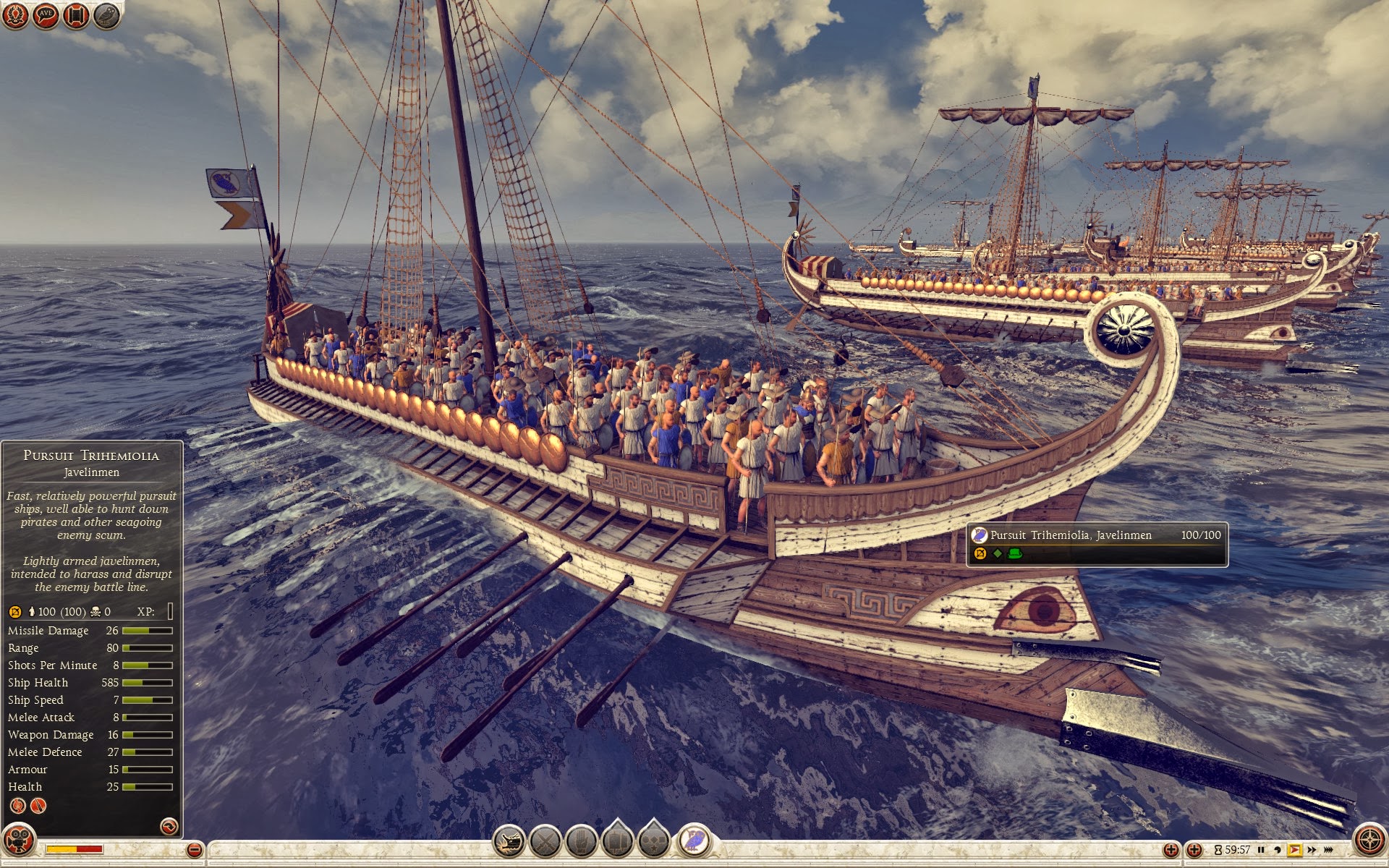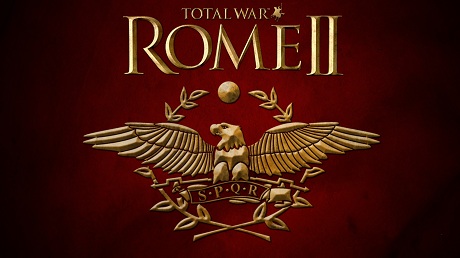Pursuit Trihemiolia - Javelinmen
Fast, relatively powerful pursuit ships, well able to hunt down pirates and other seagoing scum.Lightly-armed javelinmen, intended to harass and disrupt the enemy battle line.
It is thought that the Rhodians, a significant naval power in the eastern Mediterranean, developed the 'trihemiolia' or 'two-and-a-half' as a vessel for pirate hunting. Given that Rhodes is an island entirely reliant on the sea and shipping this is a believable theory. Pirates used the hemiola, a handy little vessel developed from the dieres or bireme, a ship with two rows of oars; it makes sense that pirate hunters would think of taking a trieres, or trireme, with three rows of oars and modifying it in a similar fashion. A trihemiolia still had three rows of oars on each side, but the top row was reduced to only half the number of oars, positioned midships. The result was a faster, handier vessel that provided a height advantage over a hemiola for any archers on board. There was also a strategic benefit to the Rhodians, who could only draw on the manpower of one island: they could have six trieres warships with full complements of rowers, or seven trihemiolias for the same number of men. The useful design was soon adopted by other maritime powers around the Mediterranean.
(Javelinmen)
The javelin is among the oldest weapons in the world. Equipped with javelins and little else, skirmishers harried their opposite numbers and peppered hoplite phalanxes before quickly retreating. This was the typical tactic of all unarmoured, javelin-armed troops: to engage at range and then fall back behind more heavily-armoured infantry, or continue attacks while trying to stay just out of reach of the enemy. Such harassment could be highly effective, in 391BC at the Battle of Lechaeum, a force of Spartans, lacking the support of skirmishers or cavalry, were severely punished by javelin-armed Athenians who refused to meet them at close quarters. Over time, shields became common, such as those used by Thracian and Greek peltasts, but in turn these were rendered obsolescent by the Hellenic thureophoroi. Nevertheless, javelinmen and other irregulars continued to play a part in many armies throughout antiquity.
Unit Name Pursuit Trihemiolia - Javelinmen |
Main Unit Key Gre_Javelinmen_Two_Halfer |
Land Unit Key Gre_Javelinmen |
Naval Unit Key greek_two_halfer |
Soldiers 100 |
Category Light Ship |
Class Missile Ship |
Custom Battle Cost 410 |
Recruitment Cost 410 |
Upkeep Cost 82 |
Missile Damage 29 |
├ Missile Weapon rome_wooden_javelin |
├ Projectile javelin_wooden |
├ Missile Damage 20 |
├ Missile Ap Damage 9 |
└ Base Reload Time 10 |
Accuracy 5 |
Range 80 |
Reload 13 |
Shots Per Minute 7 |
Ammunition 7 |
Ship Health 585 |
└ Ship greek_two_halfer |
Ship Speed 7 |
Melee Attack 8 |
Weapon Damage 24 |
├ Melee Weapon rome_shortsword |
├ Melee Damage Base 20 |
├ Melee Damage Ap 4 |
├ Armour Piercing No |
├ Bonus vs. Large 0 |
├ Bonus vs Elephants 0 |
└ Bonus vs Infantry 0 |
Charge Bonus 3 |
Melee Defence 37 |
├ Base Defence 12 |
├ Shield pelta |
└ Shield Defence 25 |
Armour 15 |
├ Armour cloth |
├ Armour Defence 10 |
└ Shield Armour 5 |
Health 45 |
├ Man Entity rome_infantry_very_light |
├ Man Health 40 |
└ Bonus Hit Points 5 |
Base Morale 25 |
Abilities
Pursuit Trihemiolia- Row Hard 10
Increases speed for 10 strokes.
Ship speed
Attributes
- Resistant to Fatigue
Fatigue has less of an effect on this unit. - Hide (scrub & forest)
This unit can hide in scrub and forest until enemy units get too close.
Strengths & Weaknesses
Pursuit Trihemiolia- Poor hull strength
- Medium crew
- Uncatchable
- Weak ramming
- Poor boarding
- Average missile combat
- Short range
- Fast rate of fire
- Very good damage and armour penetration
- Very weak in melee
- Very poor morale
| Requires Buildings | |
|---|---|
|
Harbour
(greek_port_trade_2) Level 1
Trading Port
(greek_port_trade_3) Level 2
Emporion
(greek_port_trade_4) Level 3 |
|
| Faction Availability | |
|---|---|
| Grand Campaign | |
| Samnite Wars | |
| Hannibal at the Gates | |
| Imperator Augustus | |


 Français
Français Italiano
Italiano Deutsch
Deutsch Español
Español Русский
Русский Čeština
Čeština Polski
Polski Türkçe
Türkçe 简体中文
简体中文 正體中文
正體中文 日本語
日本語









